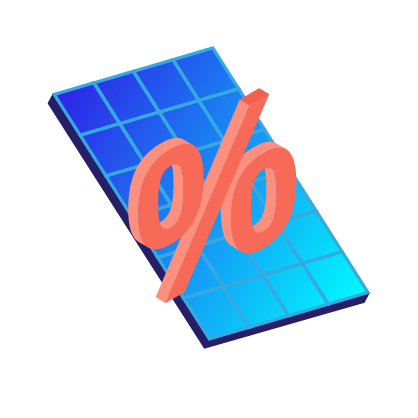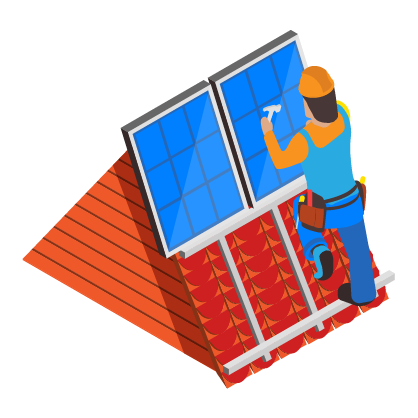See how much solar panels cost in your area

Please enter a valid zip code.
Zero Upfront Cost
Best Price Guaranteed
![]()
![]()
Solar Learning Center > Solar Panels for Home > Best Solar Panels for Homes in 2025 > Page 5
Best Solar Panels for Homes in 2025

Trying to determine the best solar panels for your home is like trying to determine the best car – there’s no single correct answer. Everybody has different budgets, goals, and capacities.
So the real question is, which solar panel is best for you?
We analyzed over 750 types of solar panel models from 40 different manufacturers available in the solar.com marketplace to determine the best solar panels to buy to meet common wants and needs.
Of course, determining your solar needs is a lot easier with the guidance of an experienced Energy Advisor. Connect with one here.
How Do We Choose the Best Solar Panels in 2025?
The ideal solar panel is going to vary from homeowner to homeowner based on their budget, energy goals, roof, and more. We’ve chosen a handful of the best panels that meet some of the most common needs for homeowners.
Let’s get started with the most popular panels to give us a sense of what other homeowners are gravitating towards.
Most popular panels on solar.com
Our analytics team analyzed a year of sales data to find a clear favorite among solar.com customers.
Given quotes from multiple installers and dozens of equipment options, solar.com customers choose REC or QCells panels over 73% of the time, followed distantly by Panasonic, SEC, Canadian Solar, and Solaria.

That’s because REC and Q CELLS have a wide range of premium panels that offer a blend of solid performance and affordability.
In 2025, solar panel wattages generally are 400W or more, meaning that at Standard Test Conditions each individual solar panel is capable of producing 400 watt-peak (Wp). However, top-end, high-efficiency solar panels can offer production of more than 450W per panel. This means that in a space-constrained area, like your roof, you’ll have higher power density.
Related: The 8 Best Solar Batteries of 2025 (and How to Choose the Right One For You)
How Solar.com Evaluates Solar Panels
The solar.com team looks at a variety of factors when evaluating “the best” solar panels.
Power rating
First, we look at the power produced. This is not just the peak wattage of the panel (although that’s an important factor), but the panel efficiency — a calculation of output relative to its size (bigger isn’t always better.
Real-world performance
The team also looks at the performance modeling of the solar panels to understand how they’ll perform in a variety of real-world conditions, such as high-heat environments and low-light angles (e.g. during sunrise and sunset).
Warranties
Next, the team looks at the warranty. It’s easy to think every solar panel has a 25-year warranty but there are small but important differences in how those warranties are structured. We look at the degradation rate of the solar panel (or how the performance will hold up over time) and the bankability of the company. A 40-year warranty sounds sexy, but it is meaningless if the company providing doesn’t have the cash position to be in business in 40 weeks.
Other factors
Finally, we look at other factors, including accessibility of the product, aesthetics, compatibility with balance of system (inverters, racking), and market risks related to exposure to tariffs or other supply chain challenges.
Related: The Best Solar Inverters for Homeowners in 2025
Solar.com’s Best Solar Panels of 2025
Solar.com’s MVP: the REC Pure-RX

Photo courtesy of REC.
It’s no surprise that the solar.com team has picked the REC Pure-RX 450 / 460-watt modules as our MVP for 2025. REC is a long-standing manufacturer in the “best of” lists and their inclusion as the overall winner for 2025 is a testament to the company’s continued commitment to delivering outstanding efficiency and power with good value.
What we liked about the REC Pure-RX
Beyond efficiency that exceeds 23% and one of the highest standard power nameplates in the industry in a sleek all-black design, the team believes that REC offers the best warranty. REC offers a .25% annual degradation rate, which means that at the end of the 25-year warranty period guaranteed power output will be more than 90% of its initial power. And they offer a payment to contractors to process warranty claims, which is a best-in-class warranty.
Thanks to REC’s hetero junction cells they also exceed in high-temperature performance. Outstanding value and performance.
REC was acquired by Reliance Industries a few years ago, which makes them highly bankable. Despite being our most popular panel quoted on solar.com we see next to no warranty claims or issues with the REC product.
The RX modules are robust with back bars and can be used in even the most punishing environments like South Florida with high wind loads.
*
*
Downsides to the REC Pure-RX
Nothing is ever perfect — and that certainly holds true for the REC Pure-RX. Because REC uses large G12 wafers their voltage window is higher than traditional modules, which means they only couple with Enphase’s 8x series microinverters. They work with Tesla string and Solar Edge as well, but when coupled with Enphase, you’re limited to the 8x. The good news is, is the 8x AC output is the highest amongst Enphase, but they come with a premium.
The Pure-RX also comes with a premium price. However, in most projects the solar.com team has modeled, these panels present a super long-term value.
The final downside is that REC has not yet invested in US manufacturing. Although Singapore and India, where these products are manufactured, are outside the purview of high tariff levels there is still risk.
Solar.com’s Rookie of the Year: The Q.Tron AC Module from Q Cells
Q Cells is not a newcomer to the space. In fact, they’re a well-established South Korean company that has made significant investments in US manufacturing in Georgia. They win the solar.com “Rookie of the Year” award for their innovative AC solar panel.
What we Like about the Q.Tron AC
Solar panels produce power in Direct Current (DC) but homes are wired in Alternating Current (AC). So, solar panels need to be coupled with inverters. Typically inverters come from third-party companies but in the case of the Q.Tron AC module, the microinverter is embedded with the solar panels junction box, which makes this product super simple to install and manage.
The Q Tron AC goes up to 22.5% efficiency in an all-black format. The panels are made in Georgia and the inverter is made in Michigan. One company, one warranty. Q Cells is driving innovation and value with their new Q.Tron AC module.
Downsides to the Q.Tron AC
Inverters are tricky devices. Power electronics in outdoor conditions for 25 years are not for the faint of heart. And while we know Q Cells to be an outstanding solar panel manufacturer, a first-generation inverter certainly gives us a little bit of pause. And, in the instance of a failure it’s not simple to just replace the inverter based on the way Q Cells designed their AC module.
Next, we have to consider the Q Home app relative to the other inverter apps, like Enphase, Solar Edge, and Tesla. While there’s nothing wrong with the Q Home app, it’s not as user-friendly or data-rich as established players.
Finally, not every installer has access or is approved to install the Q.Tron AC so market access is limited, for now.
*
*
Solar.com’s Value Player of the Year: Jinko Tiger Neo 420 – 440
Jinko is one of the largest vertically integrated global manufacturers. The Tiger Neo is their current flagship residential product and it offers the right balance of high efficiency, value, and performance.
What we Like about the Jinko Tiger Neo
Power and performance are what homeowners will get from the Jinko Tiger Neo. Although they don’t pack as much of a punch as the REC Pure-Rx, the Jinko modules typically come in at a lower price point for more price-sensitive buyers.
For homeowners with larger roofs or in areas with lower utility power rates, the Jinko’s might be the best option.
Downsides to the Jinko Tiger Neo
Although Jinko has a factory in Jacksonville, FL they’re a Chinese headquartered company, which puts them in the bull’s eye of potential tariffs from the Trump administration. This means Jinko’s pricing and availability might change rapidly.
And while the price point is appealing to many installers and homeowners you do sacrifice efficiency and warranty coverage.
*
*
How to Evaluate the Best Solar Panel Options
When evaluating the solar panels themselves, be sure to review the efficiency, power rating, warranty, and bankability of different manufacturers.
Here are the main components that make a solar panel good for home applications.
Solar Panel Warranties
The length of a solar panel warranty is a message from the panel manufacturer that they think they’ve produced the best type of solar panel. The longer the warranty, the higher the quality of the panel.
Warranties range from 10 years to 25 years for premium panels.
Although this is the warranted duration, solar panels often last much longer because of the inherent durability of the product. Because there are no moving parts in panels, they can keep generating power until the solar cells completely run out of conducting material.
If your solar panel is discovered to be faulty within the warranty period, the manufacturer will replace that panel or repair it for you. It should be noted that if the panel fails due to an installer’s workmanship error, this will instead be covered with the installation company’s workmanship warranty.
Beyond workmanship fault, there are some other exceptions to these warranties that most manufacturers follow. Panels that are damaged from environmental pollution, salt water, flying objects, severe storms, and other “acts of god” are typically excluded from warranties. In essence, only the normal wear and tear of panels are covered.
Solar Energy Performance Guarantee
In addition to covering any defects with the solar panel warranty, manufacturers also provide a performance guarantee for their products.
At this time, most manufacturers guarantee a certain level of production over 25 years, but some are now guaranteeing over 80% production for 30 years. If you want quality residential solar panels, be sure that you’re evaluating the level of production that the manufacturer is guaranteeing.
Typical performance guarantees are in the 80-85% range after 25 years. The very best solar panels are guaranteed to perform at least 90% of rated power output.
Please note that the same exclusions from the solar panel warranty also apply to the performance guarantee. So if your panels have been caked in dirt and are under-producing, the panel maker has cause to exclude your system from their guarantee. In fact, most manufacturers release their panel warranties and performance guarantees in the same document.
Solar Panel Efficiency
It’s important that every residential solar system has a monitoring system. This is the system that will allow you to view and measure real-time and historical energy production data of your system.
Some monitoring systems display this energy production data via a physical display unit, while others employ an online interface or both.
As “smart” or connected homes become more prevalent, solar installers can provide whole-house energy consumption monitoring as well. In order to ensure your solar system is producing energy normally, it’s important to make sure your solar panels are paired with an energy production monitoring system.
Solar Panel Wattage
It is easy to confuse efficiency with wattage. Wattage is a unit of measure denoting the potential electrical output of a panel under ideal circumstances.
The higher the wattage of a panel, the more electricity it can potentially produce for your home. Higher-wattage panels are ideal for smaller spaces that need higher production. However, they often come at a higher price. So it’s not always best to invest in higher wattage panels if it’s not necessary for your home.
Additionally, sometimes higher wattage panels are physically bigger. This may mean fewer panels can fit in a certain space, thereby negating the advantage of having higher wattage. Solar panel brands and products will vary in size and wattage, so be sure your PV designer is taking this into account when he or she works on your array.
If you’re looking to compare solar panels, be sure to consider the panel’s efficiency and wattage in the same breath. A high-efficiency, high-wattage panel may seem ideal, but if you have enough roof space it may not be necessary.
Solar Panel Aesthetics
As more people are going solar, the need for well-designed, aesthetically pleasing panels is becoming a higher consumer demand.
This is particularly the case in neighborhoods with some HOA requirements for solar arrays, or for a home that would need panels facing the road. Many homeowners with these considerations in mind prefer black panels when comparing solar panels, but there are various types of black panels to be aware of.
Most silicone cells are either dark blue or black. These cells are the squares that make up the face of the solar panels. The space between these cells is where you can see the backsheet. Having a black backsheet makes for a much sleeker, all-black look.
Finally, considering frame color is important. Most solar panel frames are anodized aluminum and come in silver or black. Choosing a black frame can enhance the look of your system greatly. You may be interested in getting “all black” panels, where the frame, backsheet, and cells are all the same black color.
Bankability
When choosing a solar panel brand, be careful to make sure that the company you choose will still be around to honor your warranty. Typically, larger corporations like REC and Q CELLS are safe bets and highly bankable.
The Bottom Line
At the end of the day, the best solar panel for home varies from homeowner to homeowner. What matters is that a certified installer examines your specific needs and designs a system to meet them.
Unfortunately, there are fly-by-night solar companies that offer one-size-fits-all solutions for every home. Solar.com was created to bring transparency into the solar market and connect homeowners with trusted installers.
If you’re ready to go solar, get started with multiple quotes from solar.com’s network of vetted installers.
Related Articles
Best Solar Inverters for Homeowners in 2025
While many homeowners agonize about selecting the right solar panel or battery storage system for their home, the expert Energy Advisors at solar.com know the...
Best Solar Panels and Inverters Brands of 2024
One of the most important parts of choosing solar equipment is having confidence that the manufacturer will be around in 25-30 years to honor their...
Solar Panel Warranty Guide: What You Need to Know
Going solar is a long-term investment energy savings and a clean energy future. And there’s nothing to protect that investment like a long and robust...
Top Solar Panels of 2018 & 2019
Top Solar Panels 2019 & 2018: An Overview As we’re wrapping up the year here at Solar.com, we’ve been reflecting on the last two years...
Going Solar in These Top 10 States Will Increase Your Home Property...
According to a recent report by Solar Energy Industries Association (SEIA), the U.S. installed 2.1 GW of solar capacity in Q2. The solar industry reached...
Q CELLS Opens New 1.7 GW Factory in Dalton, Georgia
South Korean solar panel manufacturer, Q CELLS, recently celebrated a monumental milestone last month. The company opened their fourth solar factory in *drum roll please*...
4 Cool New Technologies from Solar Power International (SPI) 2019
Our team just returned from a very exciting trip to the Solar Power International 2019 Convention in Salt Lake City, Utah. We toured the floor...
Cost of a Tesla Solar Roof vs Solar Panels
There’s no question that the Tesla Solar Roof is among the best looking rooftop solar systems on the market. When it was unveiled in 2016,...
The 4 Roof Types Released By The Tesla Solar Program
Tesla has finally made its solar roofs open for ordering. The smooth and textured tiles are the only roof types currently available with the Tuscan...
Here Is What Elon Musk and the Tesla Solar Program Have Been...
Every time the name Elon Musk is thrown around, most people will think of either his connection to PayPal, SpaceX, or Tesla cars. But now...
Tesla's Solar Roof Rivals
Elon Musk once again shook up the energy industry with the unveiling of solar roofs by Tesla and SolarCity on October 28th. Building Integrated Photovoltaics...
See how much solar panels cost in your area.

Please enter a valid zip code.

Please enter a valid zip code.
Zero Upfront Cost. Best Price Guaranteed.








